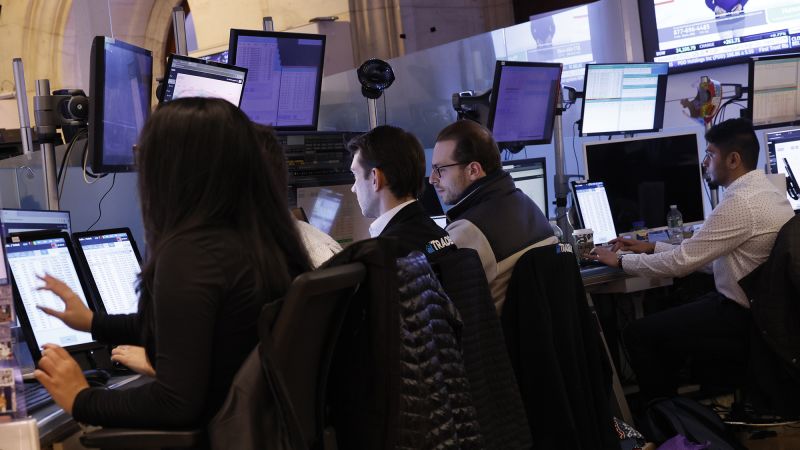A version of this story first appeared in CNN Business’ Before the Bell newsletter. Not a subscriber? You can sign up right here. You can listen to an audio version of the newsletter by clicking the same link.
Cash is king right now, but investors aren’t casting stocks away completely.
For the first time in years, cash is making investors money after the Federal Reserve last March began hiking ultra-low interest rates to their highest level in over two decades.
That’s led many on Wall Street to increase their holdings in money market funds, which are regarded as some of the most risk-free investments. Money market assets reached a record $5.71 trillion dollars in the week ended November 8, according to data from the Investment Company Institute going back to 2007.
But some investors say not to overlook opportunities in equities, especially since bond yields have begun to tread lower in recent weeks and could continue to decline in the coming months.
Yields jumped on Thursday, after Fed Chair Jerome Powell said in a speech that he’s unsure whether the central bank has adequately tightened monetary policy. The 10-year US Treasury yield rose to 4.63%, up from 4.52% on Wednesday. But yields remain far below the highs seen last month, and markets still largely expect that the Fed is done raising rates.
“I don’t think you’re going to see a breakout well above 5%,” said Emerson Ham III, senior partner at Sound View Wealth Advisors.
Ham says he sees opportunities in dividend growth stocks, whose declines this year mean they’re priced at attractive levels. Investors have turned away from dividend stocks this year, instead favoring higher-yielding bonds and Big Tech names that have soared on artificial intelligence hype.
“If you’re a believer that rates are going to go back down at some point in the future, this is the perfect time to start buying,” he said.
Dave Sekera, chief US market strategist at Morningstar Research Services, says he’s eyeing utility stocks. Utilities fell out of favor this year due to tough competition from surging bond yields. They’re also a popular defensive pick, since they provide a steady payout for investors and tend to hold up during economic downturns — a scenario that hasn’t played out this year.
The utilities sector has sagged 15% this year compared to the S&P 500’s 13% jump, making it the worst-performing sector of the benchmark index. The utility sector is trading at a roughly 10% discount, according to Sekera.
Investors also shouldn’t overlook small-cap stocks, says Matt Stucky, chief portfolio manager of equities at Northwestern Mutual Wealth Management Company.
Small-cap stocks have been battered this year by rising interest rates and turmoil in regional banks, since they have large exposure to financials. The S&P 600, an index that tracks the performance of smaller stocks, has slid 4.7% in 2023.
These stocks also tend to perform better during periods of economic recovery. But Stucky warns against trying to time when the economy could start to reaccelerate, considering that the outlook remains murky.
“It’s probably best that you keep that position in a portfolio and almost don’t look at it for the next year or so,” said Stucky.
Federal Reserve Chair Jerome Powell is leaving the door open for additional interest rate hikes to defeat inflation, he said Thursday in prepared remarks.
“We know that ongoing progress toward our 2% goal is not assured: Inflation has given us a few head fakes,” Powell said ahead of a conference hosted in Washington, DC, by the International Monetary Fund. “If it becomes appropriate to tighten policy further, we will not hesitate to do so.”
If the Fed hikes again, it will likely only be once and may come during the US central bank’s upcoming policy meeting in December, reports my colleague Bryan Mena.
However, investors are bullish about another pause in rate hikes next month, according to fed funds rate futures.
As Powell began to deliver his speech, he was interrupted by climate protesters who made their way onto the stage. It’s the second time in the past month that the Fed chair has been interrupted during an appearance, after he was escorted off stage in October at the Economic Club of New York, and it clearly raises questions about security.
After returning to the podium, Powell made it clear the Fed is carefully balancing the risk that inflation could reignite versus the risk that the central bank could cause unnecessary economic damage.
Read more here.
The Trevor Project, a suicide prevention organization for LGBTQ+ youth, is quitting social media site X, saying Thursday it is concerned about “increasing hate & vitriol on the platform targeting the LGBTQ community — the group we exist to serve.”
“If you’d like to keep up with our work supporting LGBTQ young people, we invite you to follow us on Instagram, TikTok, LinkedIn, and Facebook,” or on TrevorSpace.org, the group said in a statement about closing its account on the platform formerly known as Twitter. “No online space is perfect, but having access to sufficient moderation capabilities is essential to maintaining a safer space for our community.”
The move to leave X comes after months of concerns about hateful speech on the platform, as owner Elon Musk emphasizes his desire for what he calls “free speech” instead, reports my colleague Clare Duffy.
Musk has also taken hits at digital online watchdog groups who criticized the company’s handling of hate speech and other troubling content, including suing the Center for Countering Digital Hate and threatening legal action against the Anti-Defamation League (the lawsuit against the ADL never materialized, and the group later resumed advertising on X).
Read more here.
Read the full article here
